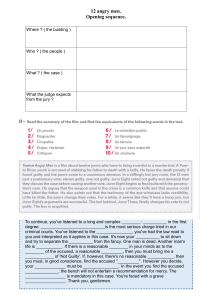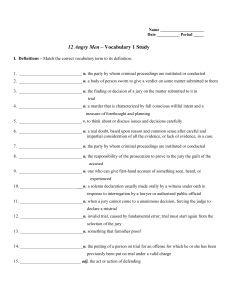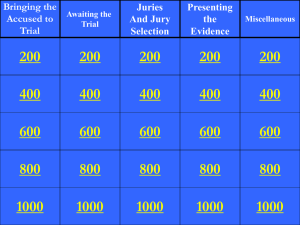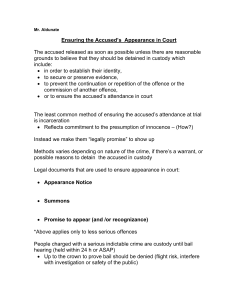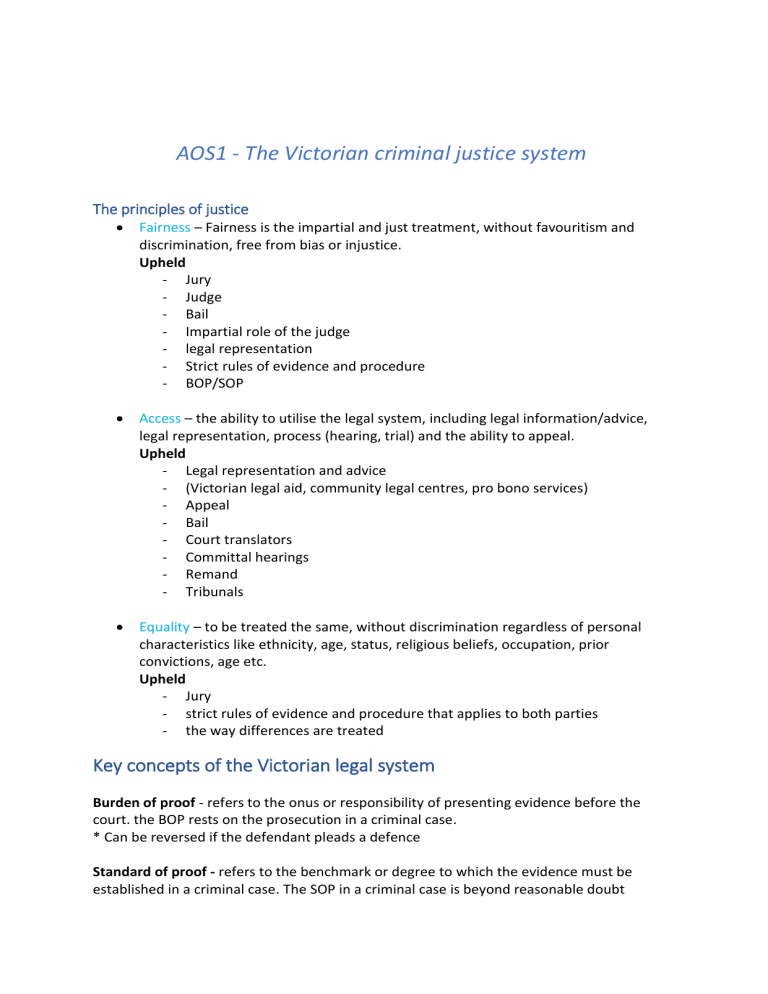
AOS1 - The Victorian criminal justice system The principles of justice Fairness – Fairness is the impartial and just treatment, without favouritism and discrimination, free from bias or injustice. Upheld - Jury - Judge - Bail - Impartial role of the judge - legal representation - Strict rules of evidence and procedure - BOP/SOP Access – the ability to utilise the legal system, including legal information/advice, legal representation, process (hearing, trial) and the ability to appeal. Upheld - Legal representation and advice - (Victorian legal aid, community legal centres, pro bono services) - Appeal - Bail - Court translators - Committal hearings - Remand - Tribunals Equality – to be treated the same, without discrimination regardless of personal characteristics like ethnicity, age, status, religious beliefs, occupation, prior convictions, age etc. Upheld - Jury - strict rules of evidence and procedure that applies to both parties - the way differences are treated Key concepts of the Victorian legal system Burden of proof - refers to the onus or responsibility of presenting evidence before the court. the BOP rests on the prosecution in a criminal case. * Can be reversed if the defendant pleads a defence Standard of proof - refers to the benchmark or degree to which the evidence must be established in a criminal case. The SOP in a criminal case is beyond reasonable doubt The presumption of innocence - the accused is innocent until they have been proven guilty in a court of law. Upheld by: - burden of approve/ standard of proof - judge/ jury being impartial - rules of evidence and procedure - bail - Right to silence nature of the offence heard in which court? Heard by... Mode of hearing how can it be heard Examples: summary less serious / minor offences Magistrates Court magistrate alone hearing can only be heard as a summary offence - shoplifting, speeding, drinking offences indictable serious county or Supreme Court jury of 12/ judge trial some indictable offences can be heard summarily - murder, manslaughter, culpable driving, sexual offences Indictable heard summarily - serious offences that can be heard Magistrates' Court as if they were minor offences (e.g. theft) if the accused pleads guilty. This allows them to receive a less severe punishment. Max of 10 years indictable offences that can be heard summarily: - the accused must plead guilty - the court mast agreed to the matter being heard in the Magistrates Court - the offence cannot carry a maximum sentence over 10 years - theft under $100,000 is a common example - the advantage is that it's quicker and cheaper and it reduces the backlog of the legal system ( so cases of a higher priority can be heard first e.g. sexual offences) The rights of the accused the right to a trial without unreasonable delay The charter of human rights and responsibilities Act 2006 (Vic) (aka - human rights charter or VCHRR) provides the accused with the right to a trial without unreasonable delay for all individuals arrested or detained on a criminal charge, without discrimination the criminal procedures Act 2009 (Vic) provides the accused with time limits in order to uphold a trial without unreasonable delay, without discrimination sexual offences - trial must commence three months after being committed to stand trial all other indictable offences - trial must commence within 12 months of being committed to stand trial the VCHRR states that children charged with a crime must be brought to trial as quickly as possible fairness access equality Positives protects all accused right provided to all because the right is regardless of crime accused without committed discrimination criminal procedures equality is achieved increases the act establishes clear likelihood of guidelines for time boundaries evidence being accused’s to access that one set based reliable the legal system on the crime committed, not personal characteristics negatives the legal system there are still mine is being heard prioritises particular ‘reasonable’ reasons ‘as quickly as crimes (sexual for delay which may possible’ may be offences) more limit access seen as swiftly which may discrimination based decrease fairness at time locality of on age courts may increase reasonable delays the ability of cases accused who may be may see the being heard without socio economically reliability of unreasonable delay disadvantage, have evidence diminished language barriers, or and and accused suffer a cognitive disadvantaged from impairment may not a trial without bias be aware of the right and criminal procedures act timelines afforded to them. The right to a fair hearing The VCHRR establishes the right to a fair hearing, explicitly stating that an individual charged with a criminal offence has the right to an independent, impartial and competent court, that is open to the public. The Criminal Procedure act 2009 (VIC) establishes mechanisms to uphold this right, including: Legal representation – allows for an even playing field and no power imbalance to occur, as both parties have access to legal representation. Positives Rules of evidence and procedure Judge/ magistrate Committal hearing – undertaken in the Magistrate’s Court to determine if the prosecution has sufficient evidence to gain a conviction in a superior court before a properly instructed jury Fairness Independent judge and magistrate ensures that the case is heard and determined impartial, giving the parties grounds for appeal A fair trial is achieved b/c it is open to the public and transparent in nature as it safeguards that rules of e/p are followed. Negatives Through public and media scrutiny, subject to bias Bias may be present, regardless of the court being open to the public An accused who is not familiar with the rules of evidence + procedure may not be able to gain a fair hearing. Lack of legal representation Access Providing legal representation via VLA/CLCs (community legal centres) allow for people to utilise the legal stem. Ability to access interpreters, specialist courts – Koori court, Drug court to steam line hearing Inability to afford expert witnesses mat diminish a fair hearing. Equality The right to a fair hearing is provided to all individuals; regardless of personal characteristics or crime charged with The right to a fair hearing allows the legal system to include interpreters for people with language barriers, support people for minors or ppl with disability Socio-economic statues may affect the fairness to the hearing as people with lower income may fail to have powerful legal representation If bail is refused it will limit an There may be a level of bias due to accused access to resources (such the accused individual as legal advice) whilst awaiting to circumstances (due to jury) stand trial The right to a trial by jury The commonwealth of Australia Constitution Act 1900 (UK) establishes the right to a trial by jury for all individuals who have been charged with a Commonwealth indicatable offence. The Criminal Procedure Act 2009 (VIC) establishes the right to a trial by jury for individuals charged with an indictable offence who pleads ‘not guilty’. However, we could interpret from the ‘right to fair trial’, that a jury falls into the category of ‘independent, impartial court’; as the jury is a cross section of society and allows an individual to have access to a trial by their peers. Positives Fairness Trial by peers – cross section of community allows the decision to be shared amongst 13; rules out bias Access Equality No legal jargon is used, Jury comes from all thus ensuring that walks of life, thus a jurors have access to chance of necessary information undertaking actions of accused Represent community values; not 1 individual Negatives Juror may have preconceived biases b/c of the jury selection process and the ability to be exempt, disqualified or excused how much of a cross section makes it fair in order to determine a just verdict Since all indictable trials are public, it provides accessibly to the media to ensure the jury and trial is constructed justly An accused person will not have access to a jury in summary offences or if they plead guilty Some members of society may fail to be provided with an avenue to sit on a jury as they may be challenged Jury afforded to all accused who pleads not guilty of an indictable offence regardless of personal characteristics Those with disability may not be able to be empanelled Rights of Victim Victims Charter 2006 (VIC) The right to give evidence as a ‘vulnerable witness’ The right to be informed about the likely release date of the accused The right to informed about proceedings The right to give evidence as a vulnerable witness Although there is no clear definition as to who falls into the classification of a ‘vulnerable witness’, a judge has discretion to classify witnesses if vulnerable if they are a child, a person with a cognitive impairment, a victim of a sexual offence or domestic violence. The Criminal Procedure Act 2009 (VIC) establishes these parameters and the various mechanisms to uphold this right including: Alternative arrangements are provided to witnesses/ victims of sexual offences, domestic violence, obscene/ indecent/ threatening language, or behaviour. This can include giving evidence via, CCTV, screens being placed in front of the accused, a support person, and requesting legal personnel dress informally (without robes/ wigs). Protected witness – a victim of a violent crime or a crime of a sexual offence may also be declared a protected witness. This would then allow the victim to not be questioned by the accused (self-represented) or the defence barrister/ solicitor. Rather the defence would provide the prosecution with the list of questions to ask the protected witness on their behalf. Special protections – are provided to people with a cognitive impairment; allowing their examination in chief to be pre-recorded (out of court, yet still following rules of evidence and procedure). A copy is the provided to the defence team to prepare for questioning in the court room. The recording would also be played at trial. Rights of the victim Positives Negatives Fairness Access Equality Each provision is individualised which aims to eliminate fear from the legal system The valuable witness is able to utilise the legal system and be involved in the trial, thus allowing for the trial to gain insight into evidence which may have not otherwise been introduced All vulnerable witness are afforded the right regardless of personal characteristics (if is based on case facts) The accused has to follow provision of the alleged even if they want to object Judge has discretion to classify witnesses if they are vulnerable, so may discriminate against people because of personal characteristics (age + cognitive impairment) All 3 provisions allow for both parties to be on an even playing field, which upholds fairness If alternative arrangements are made such as the use of a screen, then it may look like the accused is guilty to the jury The alternative arrangement could potentially increase the bias of the judge and jury The rights of the victim are not enforceable therefore limiting their ability to utilise the legal system. The right to be informed about proceedings The victims charter 2006 (VIC) establishes that a victim has the right to be informed about proceedings and about the criminal justice system. This includes information regarding: - Details of the offence - Charges laid - Whether the accused has been taken into custody (remand) - Date/ time of hearings/ trial/ appeals - If no charges have been laid - Updates regarding investigation e.g., James Gargasoulas, a website was created because they were many victims and so many bystanders to provide updates on the investigation… The victim should be informed at regular intervals by the police, investigatory bodies, OPP/DPP and the Victims Commissioner. A victim may opt not be informed at regular intervals and many request on particular information to be disclosed. Positives Fairness Access - All victims are provided with information regarding the accused case to provide an 'even playing field' during trial - Reduces stress and uncertainty for the accused, preventing fear before/during the trial commences Victims who are informed about proceedings can prepare for the case appearing in court Prevent Bail application Victim impact statement Giving evidence Negatives - Witnesses may only provide information at 'reasonable intervals', this may be different per case as it is subjective, creating a level of bias or unfairness - Police, OPP/investigative bodies may hold bias towards particular victims which may delay communication of info -Witnesses may only provided information at 'reasonable intervals', - Unreasonable intervals can prevent the victim from obtaining assistance - VOCAT = Victims of Crime Assistance Tribunal -No way of enforcing that information has to be provided in reasonable intervals; more done on good will Equality - The withholding of information is based of the facts of the case, not due to individual circumstances therefore no discrimination - All witnesses are afforded this right regardless of personal circumstances; the criteria for the provisions are only based of the facts of the case - Although a victim has the right to be informed, whether there is a capacity to inform the victim in a manner that is appropriate (language other than English, without legal jargon, etc) The right to be informed of the release date of the accused The victim’s charter states that a victim of a “criminal act of violence’ including: - Stalking - Kidnapping - Rape and other sexual offences - Culpable driving causing death - Child stealing Corrects Act 1986 - if offender is convicted of acts of violence, the victim can apply to receive information about the accused if they are on the Victims Register 14 days before (workplace, suburb etc) Adult Parole Board - victim can express how the offender may affect their life on release to ensure there isn't any contact between the parties A victim must place their name on the Victims Register in order to access the release date of the offender, if the offender is to be released on parole, has escaped prison or if they are changing prisons (e.g., moving from Barwon prison to Loddon prison.). A victim has the right to communicate with the Parole Board of they object to the offender being released. The Victim must be informed 14 days prior to the release of the offender. Fairness Access Equality Positives -The Victims Register allows for the relevant victims to be provided with this info, thus establishing a criteria that is free from bias - Provides information that allows the victim to make a submission to the Parole Board - Provides information regarding change of venue, allowing the victim to main application to refute Regardless of individual circumstances Negatives -Not all crimes are represented in this right, therefore not all victims will be provided with the release date of the guilty accused -People who are not 'legally' considered as a victim, but still may be significantly impacted by the crime may not gain this right -If a victim is not informed about their right and fails to put their name on the Victims Register they will not be informed - Limited offences Certain groups may no understand the process or procedures
